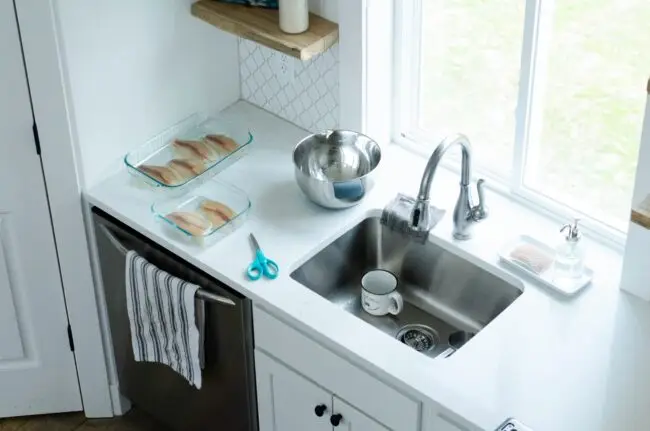 Has your kitchen sink been draining slowly or constantly getting backed up, causing a foul odor and stressful cleanup? The culprit might not be your sink itself, but instead what you’re putting down it. Not only is it vital to learn more about essential garbage disposal do’s and don’ts, but it is also important to work with a Houston garbage disposal repair expert like our team at Santhoff Plumbing.
Has your kitchen sink been draining slowly or constantly getting backed up, causing a foul odor and stressful cleanup? The culprit might not be your sink itself, but instead what you’re putting down it. Not only is it vital to learn more about essential garbage disposal do’s and don’ts, but it is also important to work with a Houston garbage disposal repair expert like our team at Santhoff Plumbing.
Plumbing in Houston has a variety of unique challenges. During storm season, there is nothing worse than having a malfunctioning disposal paired with your power going out. Additionally, flooding can cause water damage caused by faulty disposal to multiply in minutes. Learning the top offenders of typical garbage disposal mishaps can save you time and money, as well as loads of stress and cleaning in the future.
Understanding Your Garbage Disposal: How it Works
Most garbage disposals work by grinding any food waste into tiny pieces using a spinning impeller plate and shredding ring. The system is then flushed when you run the sink water through the pipe. Because a motor powers the ring, it easily breaks down most foods into a slurry that smoothly passes through your plumbing system. However, no matter how powerful the motor, some foods can cause buildup to form on the blades, leading to clogs and malfunction over time.
Being sure your garbage disposal is in top-tier condition is vital for ensuring optimal performance over time. Not only are disposal repairs important for daily life, but they also greatly contribute to your kitchen’s cleanliness. Run-down, clogged drains can lead to rapid bacterial growth, which can cause foul odors and potentially water damage if left long enough. At Snathoff Plumbing, we are proud to be a premier Houston garbage disposal repair service team. We understand how crucial this component is for all of your kitchen functions, so we strive to get our clients back to full capacity in no time.
Garbage Disposal 101: Top Foods to Ditch Going Down the Drain
Many people have no clue what they should and shouldn’t be putting down their disposal. By educating yourself and your family, you can extend the lifespan of your disposal and avoid costly repairs in the future.
1. Hard Foods
Some people may think that the rotors on a disposal system are sharp; however, they are blunt and are only able to break down food due to the centrifugal force. This leads many people to put hard food, like animal bones, fruit pits, or seafood shells, down the drain. However, this can lead to extremely negative outcomes for your disposal system. Because of how hard these foods are, they can dull the grinding equipment and even jam the motor. Over time, parts could be completely broken, leading to an expensive repair or potentially a replacement. Even if they can move through the disposal system without damaging anything, they can cause detrimental problems further down the plumbing system.
But if I can’t put it down the disposal, how can I dispose of it? A great alternative for getting rid of bones, pits, or shells is to compost them or throw them away in your regular trash bin.
2. Starchy Foods
Foods like cooked pasta, rice, oatmeal, or bread can wreak havoc on your garbage disposal because of how it reacts to moisture. When these foods become wet, they expand and form a sticky, glue-like paste that can begin to coat the inside of your plumbing system. This can contribute greatly to clogging as it gradually builds up over time. Eventually, this can cause slow drainage, odors, and full blockages. Instead of rinsing your cooked starches down the drain, be sure to scrape them into your trash can for optimal disposal performance.
3. Fibrous Foods
While it may seem like fibrous foods may be easily broken down by a garbage disposal, it is quite the opposite. This includes things like celery stalks, corn husks, asparagus, artichokes, onion skins, and banana peels. These types of waste can negatively impact your disposal system by wrapping around the impellers and shaft. If they wrap around enough, they can potentially lead to motor burnout and jams.
A great alternative to putting your discarded veggie scraps down the disposal is to compost them. Composting can help improve the quality of your yard’s soil, conserve water, and reduce waste. By working toward a healthy disposal system, you can help contribute to a happier environment.
4. Grease, Fats, and Oils
It’s common knowledge that things like grease, fats, and oils cannot be rinsed down a garbage disposal, but they are also one of the most common culprits for our Houston garbage disposal repair service calls. Grease and oils can damage your disposal because of how it cools. While it may be a liquid right when you finish cooking a meal, as it cools, it will gradually harden. When the grease hardens, it can trap debris and also cause build-ups – this can cause significant blockages and costly repairs.
5. Non-Food Items
Last but not least, any non-food items that may accidentally go down your disposal can have significant consequences. This could include things like silverware, glasses, bottle caps, twist-ties, or sponges. When these enter the disposal system, not only can they severely damage the system itself, but they can also create flying debris and safety hazards.
If you notice a non-food item in your disposal before you turn it on, be sure to call a professional Houston garbage disposal repair company like Santhoff Plumbing before investigating.
What to Do If Your Garbage Disposal Clogs
Being able to spot the early signs of a clogged drain is integral for preventing small issues from turning into more significant problems over time. Things to look out for include odd noises, such as humming and grinding noises. Along with noises, look for water backing up into the sink after you turn on the disposal – this could indicate a blockage from food buildup. Any kind of foul odor, especially if it smells like burning, could possibly point to an issue with the motor and require a professional check-up. Finally, if you see any sort of water leakages, it is recommended to call a Houston garbage disposal repair service company immediately.
Upkeep Tips for Optimal Disposal Effectiveness
While learning the main food items not to feed your disposal is the most important factor for preventing clogs, you can also use a variety of ways to clean and manage your system. Always use cold water before, during, and after turning on your disposal. This helps solidify any grease, allowing it to be broken up more effectively before it sticks.
You can also feed your disposal ice cubes or citrus peels to help dislodge build-up and deodorize and eliminate foul odors. Avoid things like bleach and drain cleaners, as these can commonly lead to corrosion within your plumbing system.
Keep Your Disposal Running Smoothly with Houston Garbage Disposal Repair Service
To maintain your system’s effectiveness, understand how your garbage disposal works and what items you should not discard down the drain. By learning what kinds of food waste can negatively affect your disposal, you can keep a huge headache at bay and your kitchen in top-tier condition.
Contact us today to learn more about our Houston garbage disposal repair services!

